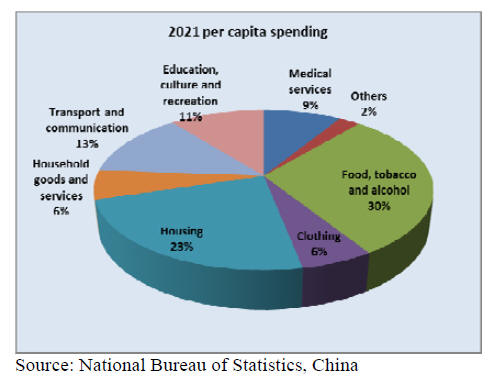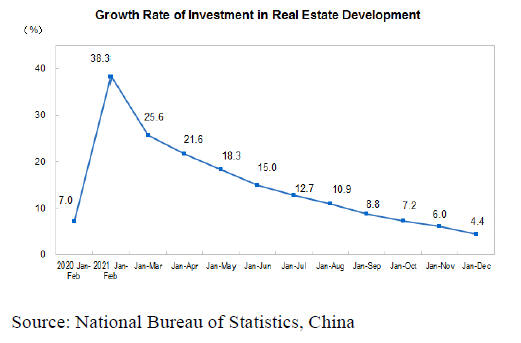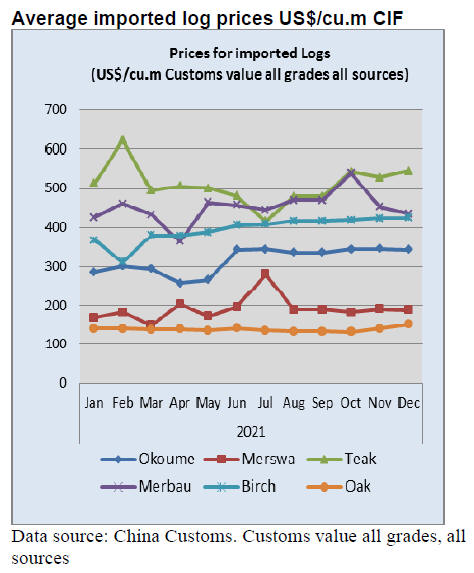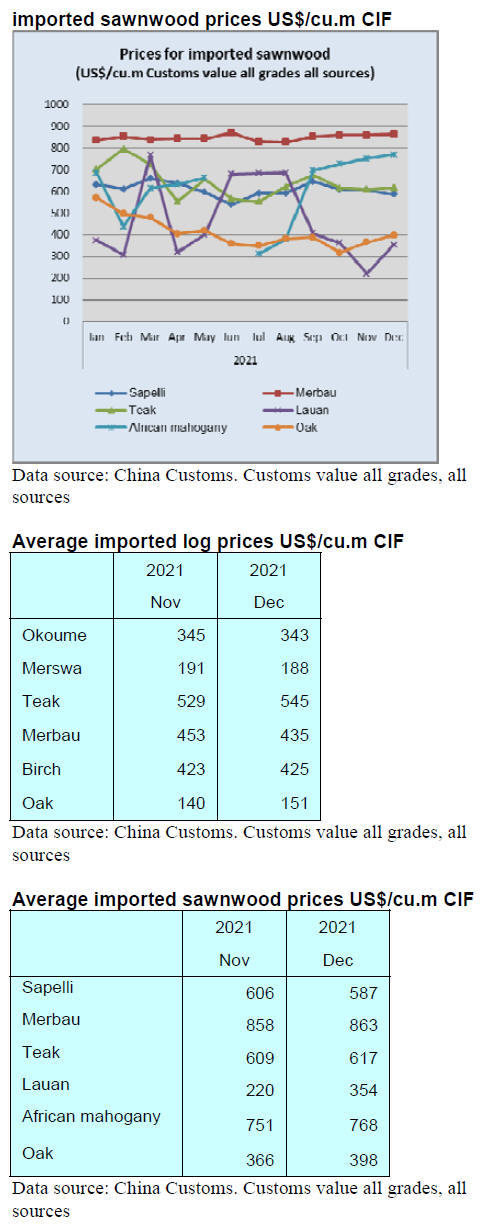US Dollar Exchange Rates of
25th
Jan
2022
China Yuan 6.361
Report from China
Real estate downturn and inflation the greatest
challenges this year
China¡¯s economy saw many challenges in 2021 due to the
ongoing China/U.S. trade dispute, COVID-19 restrictions,
power shortages and weakness in the real estate sector.
The Chinese government has prioritised economic stability
for 2022. Han Wenxiu, Deputy Director of the Office of
the Central Committee for Finance and Economics, is on
record as saying introducing policies that may have an
economic tightening effect should be avoided. 2022 will
be tough, the World Bank forecasts China¡¯s 2022 growth
at 5.1%, a much slower pace of growth than average in
previous decades.
While the economy will continue to be impacted by the
ongoing trade dispute and the likelihood of the widespread
Omicron infections it will be the real estate downturn and
inflation that will present the greatest challenge. In
response China is likely to boost GDP by investing in
infrastructure.
Household income and consumption in 2021
A press release from the National Bureau of Statistics
reports that in 2021 per capita disposable income in China
reached 35,128 yuan, up 9% over the previous year. The
average growth in disposable income over the past two
years was 6.9%. The per capita disposable income of
urban residents was 47,412 yuan, an increase of 8.2% and
the per capita disposable income of rural residents was
18,931 yuan, an increase of 10.5%.

In 2021, the per capita consumption nationwide was
24,100 yuan a real increase of 12.6% after deducting the
influence of price factors. Consumption increased by
almost 12% compared to 2019. Consumption by urban
residents was 30,307 yuan, up 12.2% and that of rural
residents was 15,916 yuan, an increase of 16%. The per
capita expenditure on household goods and services
averaged 1,423 yuan, an increase of 13% year on year and
expenditure on furniture rose 14% in 2021.
See:
http://www.stats.gov.cn/english/PressRelease/202201/t20220118_1826649.html
2021 Real estate development
In 2021 investment in real estate development nationwide
was 14,760.2 billion yuan, an increase of 4.4% year on
year and an increase of 11.7% over 2019. Investment in
residential buildings increased 6.4% over the previous
year. It will be seen from the graphic below that the pace
of growth in real estate investment has slowed almost
throughout 2021.

2020 output of wood-based panels
In 2020, despite the effects of the pandemic, China's
woodbased panel industry quickly resumed production
such that output was maintained at pre-pandemic levels.
The output of China¡¯s woodbased panel sector in 2020
rose almost 1% to 311 million cubic metres, a record high.
Plywood was the main contributor to the increase rising
12% to 256 million cubic metres.
Domestic consumption of wood-based panels in 2020 was
296 million cubic metres. Plywood was the largest
category accounting for 63% of total consumption of
wood-based panels.
Exports were 11.94 million cubic metres with an export
value of US$5.218 billion in 2020, down 6% year on year.
Woodbased panel imported totaled 1.51 million cubic
metres at US$496 million.
The structural reform of China's wood-based panel
industry continues and the elimination of outdated
production capacity accelerated in 2020. 17,500 plywood
manufacturers had stopped production by the end of 2020.
781 fibreboard production lines had been closed,
dismantled or suspended and 33.16 million cubic metres of
outdated production capacity had cut.
A total of 1,123 particleboard production lines were
closed, dismantled or suspended and 27.72 million cubic
metres of outdated production capacity was cut.
At the end of 2020 China had 136 continuous flat-pressed
fibreboard production lines with an annual production
capacity of 26.92 million cubic metres accounting for
around half of the national total fibreboard production
capacity.
There were 73 continuous flat-press particleboard
production lines by the end of 2020 with a total production
capacity of 17.63 million cubic metres. Some large
automated plywood production lines have been put into
operation and continuous plywood production lines were
under construction.
Green innovation helped Chinese wood-based panel
enterprises to further improve their market competitiveness.
Functional wood-based panel products continue to develop
and explore and low-density and high-performance woodbased
panel products become the focus of market
attention. Formaldehyde-free wood-based panel products
continue to be recognised in the custom home furnishing
market.
In 2020 the supply of wood-based panel materials in China
was increasingly tight due to raw material supply issues.
Fast-growing plantation of eucalyptus and poplar are still
the main raw materials for wood-based panel production
in China.
The proportion of waste wood recycling is expanding and
the use of non-wood materials such as straw and reed is
further mature.
There are wood-based panel production in 26 provinces
(autonomous regions and municipalities), among which 7
provinces, namely Shandong, Jiangsu, Guangxi, Anhui,
Hebei, He¡¯nan and Guangdong each produce more than 10
million cubic metres of wood-based panel products.
The output of wood-based panels in China will remain
stable during the 14th Five-Year Plan period. The
proportion of low - or formaldehyde-free wood-based
panel products is increasing. The biggest problem in 2020
and at present is the supply of raw materials. This text is
Based on a report provided to members of the China Forest
Products Industry Association and summarized at:
https://new.qq.com/omn/20211217/20211217A05Y7100.html
South Korea joins RCEP
The General Administration of Customs has announced
that South Korea is now a member of the Regional
Comprehensive Economic Partnership (RCEP). RCEP
entered into force on 1 January 2022 with six ASEAN
member countries, Brunei, Cambodia, Laos, Singapore,
Thailand and Vietnam and four non-ASEAN member
countries, China, Japan, New Zealand and Australia.
Rise in VAT rebate for wood based panels
A notice has been issued jointly by the Ministry of
Finance and the State Taxation Administration increasing
the VAT rebate rate from 70% to 90% for woodbased
panels (fibreboard, particleboard and blockboard) and a
range of other products.
See:
http://www.chinatax.gov.cn/chinatax/n359/c5171843/content.html
Man Wah to build factory in Mexico
In a press statement Man Wah Holdings Limited has
reported the purchase 339,000 square metres of land in
Mexico where a factory will be built. This company says
this will help them address the risk of global sea freight
fluctuations, reduce related logistics costs and create better
opportunities in the North American market.
Since its establishment in Hong Kong in 1992 Man Wah
Holdings Ltd together with its subsidiaries has been
mainly engaged in services of sofas, mattresses and smart
homes.
See:
http://www.manwahholdings.com/en/show_list.php?id=9
Bamboo exports from Shaoyang city
According to Shangyang Customs the value of bamboo
products exports from Shaoyang City in Hu¡¯nan Province
rose 21% year on year to RMB90.83 million in 2021.
Bamboo products exports from Huali Bamboo and Wood
Co. Ltd in Shaoyang City rose over 30% year on year to
RMB25 million in 2021. Until recently the company used
imported timber for its products but due to the problems of
securing supplies the company turned to domestic bamboo
which not only reduced costs but the products were well
received in the market.
See:
http://www.customs.gov.cn/customs/ztzl86/302414/302415/dsxxjy/xxdt/4110274/index.html


|